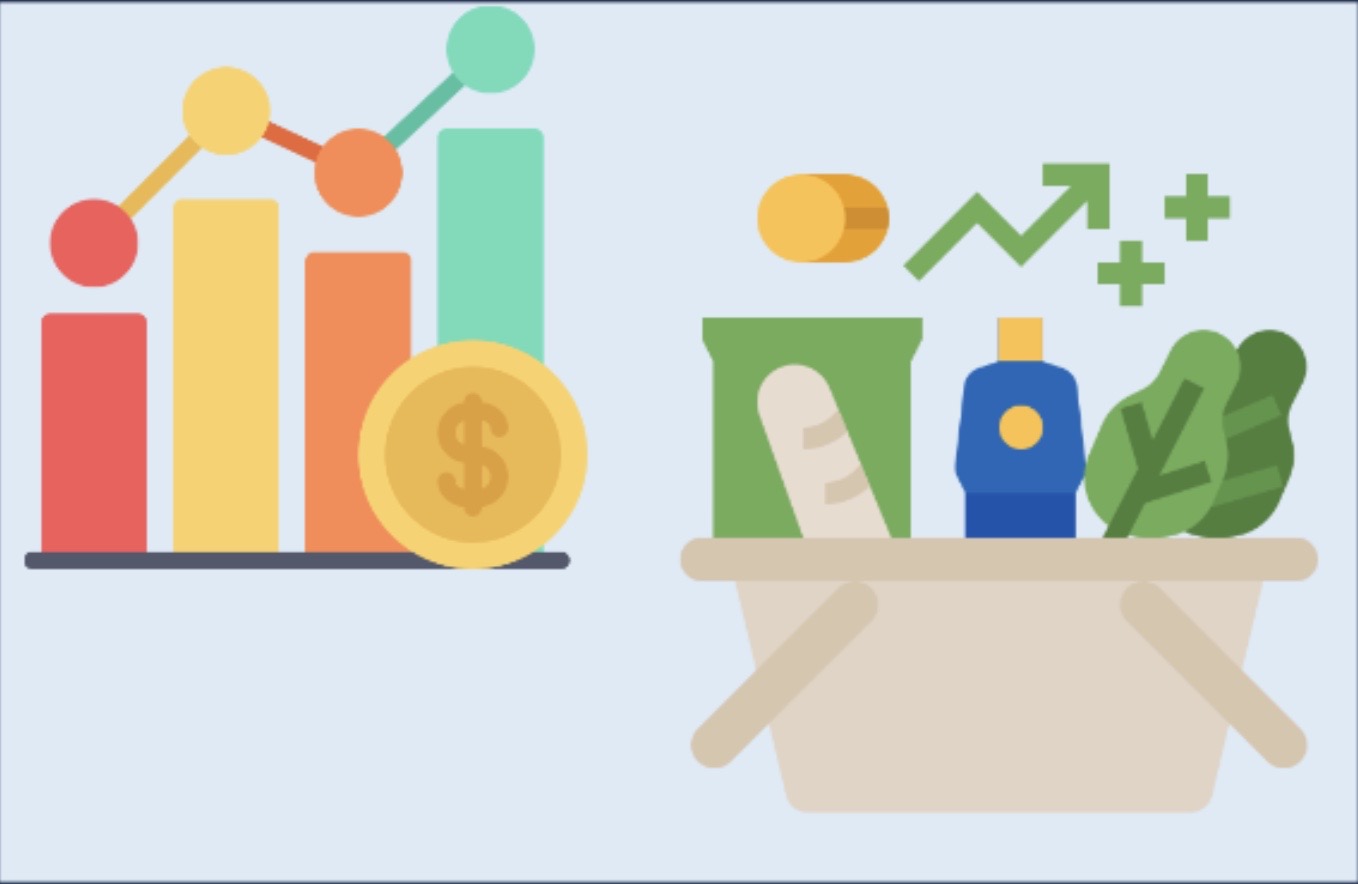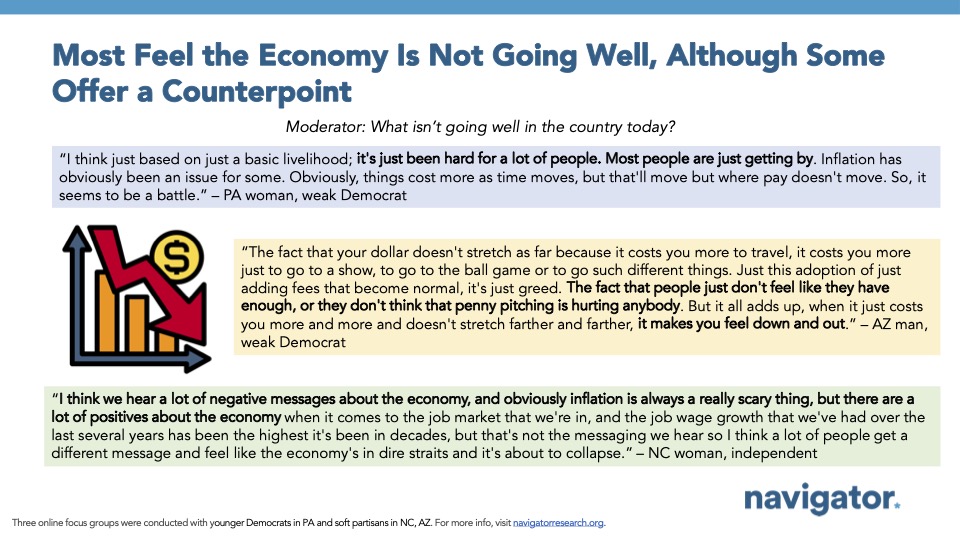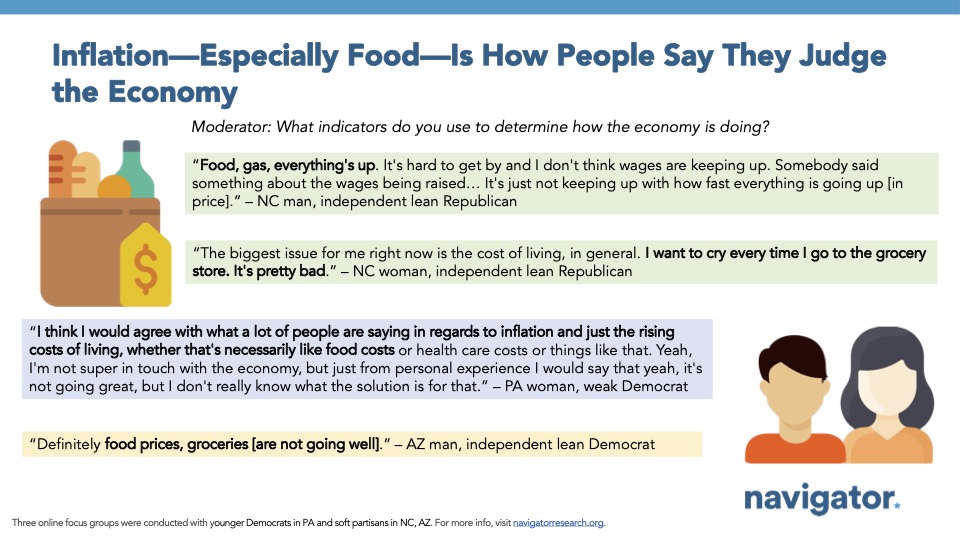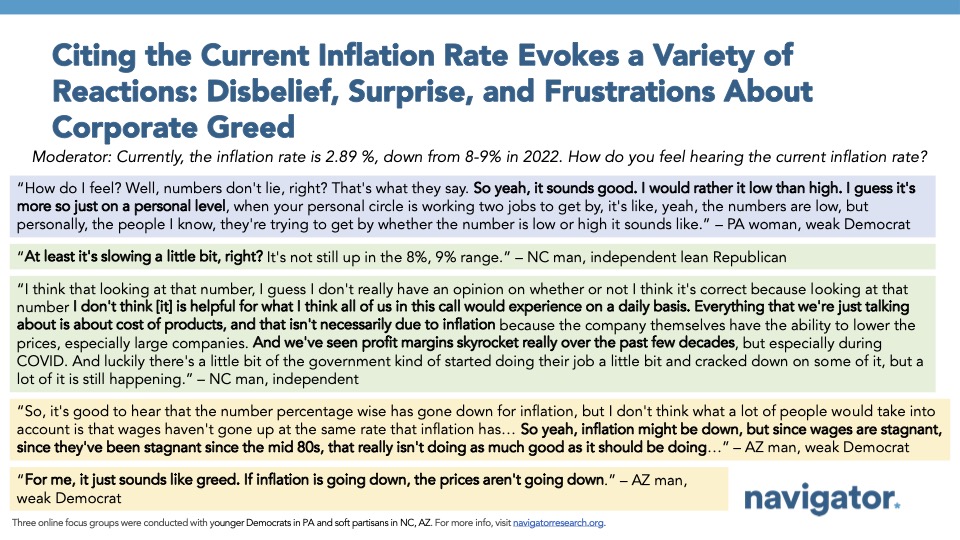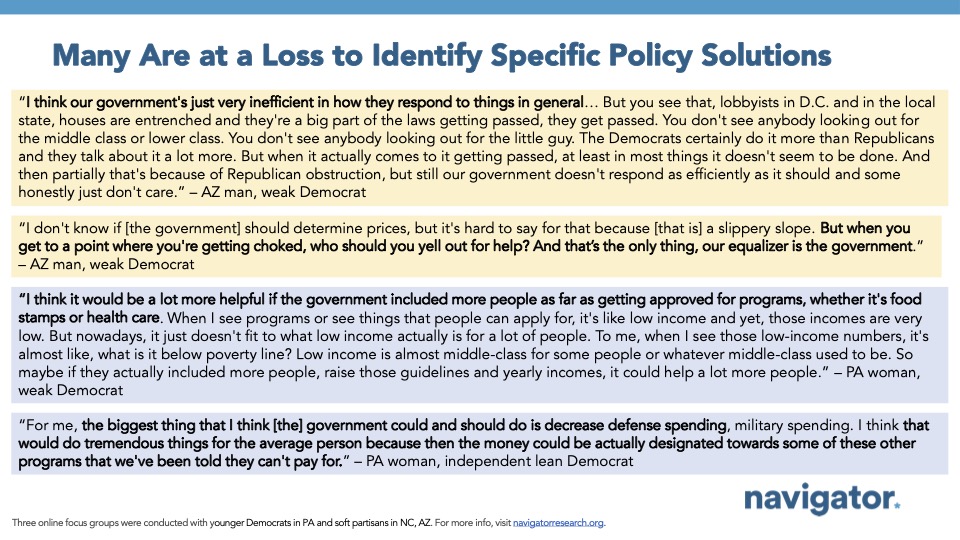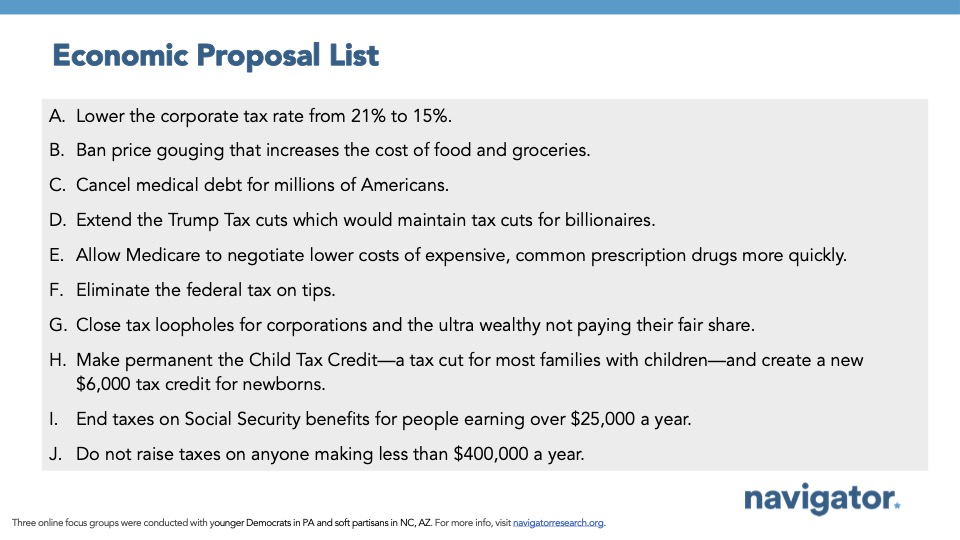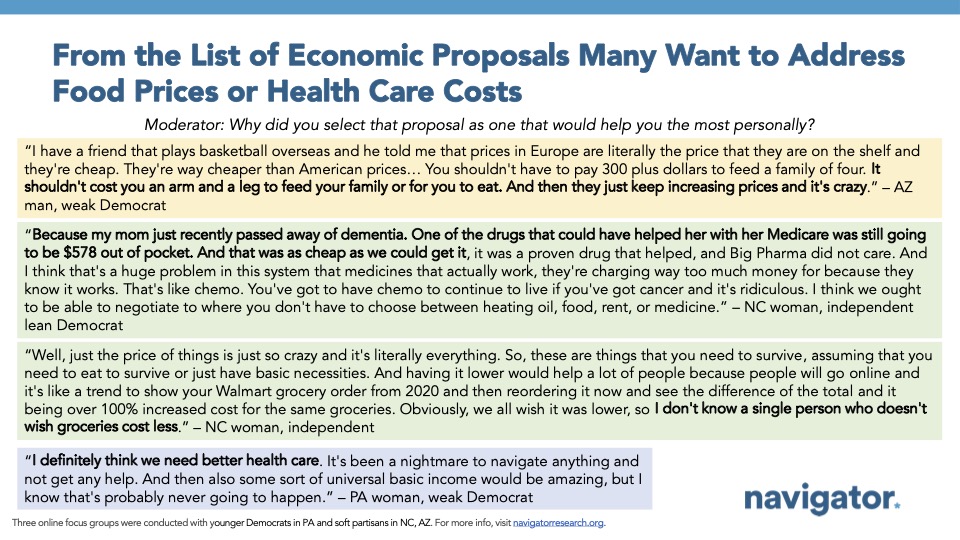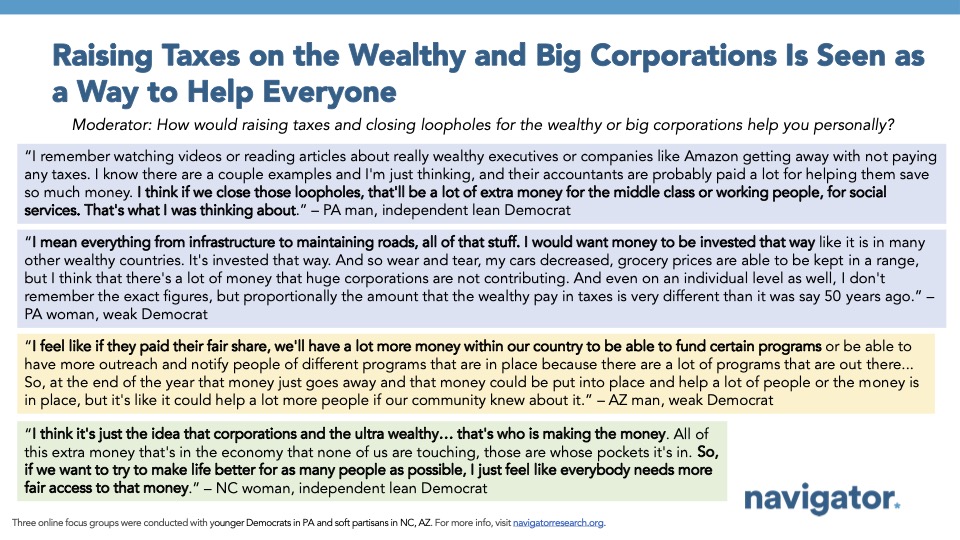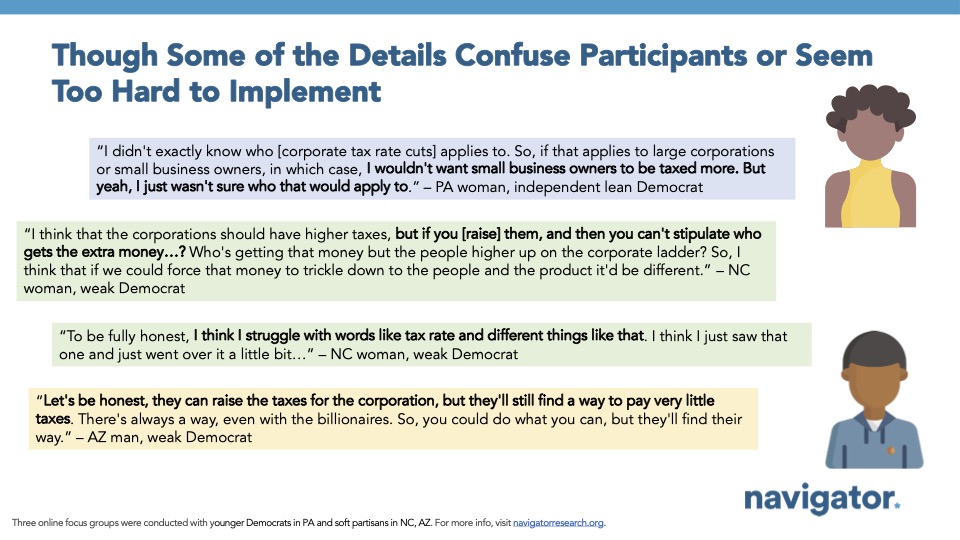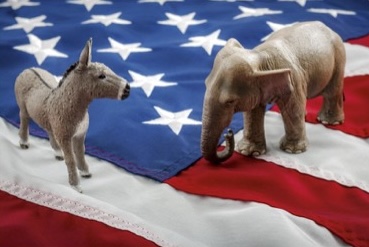Focus Groups: The U.S. Economy
This Navigator Research report contains findings from focus groups conducted among young Democrats in Pennsylvania, independent men of color in Arizona, and white independents in North Carolina, on the latest perceptions of the economy, both broadly and personally, including what they see as the biggest pain points facing the economy and how the government should address them.
Participants feel the economy is not doing well, as inflation and rising costs remain a pervasive worry.
The economy comes up as an example of something going poorly. As a man in Arizona said: “The fact that your dollar doesn’t stretch as far because it costs you more to travel, it costs you more just to go to a show, to go to the ball game or to go [to] such different things… it all adds up, when it just costs you more and more and doesn’t stretch farther and farther, it makes you feel down and out.”
- Rising costs, specifically of groceries and utilities, is how many express economic pain. As a woman in North Carolina said: “The biggest issue for me right now is the cost of living, in general. I want to cry every time I go to the grocery store. It’s pretty bad.”
- While participants believe statistics about the current inflation rate, the fact that it is lower than it once was (2.89% today relative to 9% in 2022) does little to ameliorate concerns. As a Pennsylvania woman said: “Well, numbers don’t lie, right? That’s what they say. So yeah, it sounds good. I would rather it low than high. I guess it’s more so just on a personal level, when your personal circle is working two jobs to get by, it’s like, yeah, the numbers are low, but personally, the people I know, they’re trying to get by whether the number is low or high it sounds like. So yeah, I’d rather it be low.” An Arizona man echoed the sentiment, saying: “So yeah, inflation might be down, but since wages are stagnant, since they’ve been stagnant since the mid 80s, that really isn’t doing as much good as it should be doing.”
- Many participants blame large corporations for inflated prices. An Arizona man said: “For me it just sounds like greed. If inflation is going down, the prices aren’t going down,” while a North Carolina man similarly said: “Everything that we’re just talking about is about cost of products, and that isn’t necessarily due to inflation because the company themselves have the ability to lower the prices, especially large companies. And we’ve seen profit margins skyrocket really over the past few decades, but especially during COVID. And luckily there’s a little bit of the government kind of started doing their job a little bit and cracked down on some of it, but a lot of it is still happening.”
- When asked what they would like to see the government do to address economic woes, a Pennsylvania woman said: “I think it would be a lot more helpful if the government included more people as far as getting approved for programs, whether it’s food stamps or healthcare.“ Others were less sure, as an Arizona man said: “I don’t know if [the government] should determine prices, but it’s hard to say for that because [that is] a slippery slope. But when you get to a point where you’re getting choked, who should you yell out for help?” Another Arizona man wasn’t sure whether the government could be helpful, saying: “I think our government’s just very inefficient in how they respond to things in general… You don’t see anybody looking out for the middle class or lower class. You don’t see anybody looking out for the little guy.“
Raising taxes on the wealthy and big corporations resonates as a policy that could improve the economy for everybody.
Among a list of economic proposals, proposals to address food prices and health care costs are seen as most impactful. As a North Carolina woman said: “Well, just the price of things is just so crazy and it’s literally everything. So these are things that you need to survive, assuming that you need to eat to survive or just have basic necessities.” Proposals to raise taxes on the wealthy and big corporations seemed like obvious ways to help the economy, as an Arizona man said: “I feel like if they paid their fair share, we’ll have a lot more money within our country to be able to fund certain programs or be able to have more outreach and notify people of different programs that are in place because there are a lot of programs that are out there… So at the end of the year that money just goes away and that money could be put into place and help a lot of people or the money is in place, but it’s like it could help a lot more people if our community knew about it.” A Pennsylvania man similarly said: “I remember watching videos or reading articles about really wealthy executives or companies like Amazon getting away with not paying any taxes… I think if we close those loopholes, that’ll be a lot of extra money for the middle class or working people, for social services.”
- Some worry that the plan will be too difficult to implement. An Arizona man said: “Let’s be honest, they can raise the taxes for the corporation, but they’ll still find a way to pay very little taxes. There’s always a way, even with the billionaires. So you could do what you can, but they’ll find their way.” A Pennsylvania woman worried that a corporate tax increase would apply to small businesses: “I didn’t exactly know who [corporate tax rate cuts] applies to. So if that applies to large corporations or small business owners, in which case, I wouldn’t want small business owners to be taxed more.”
About The Study
GBAO conducted three online focus groups August 28, 2024 with younger Democrats in PA, and soft partisans in NC and AZ. Some quotes have been lightly edited for brevity. Qualitative results are not statistically projectable.
